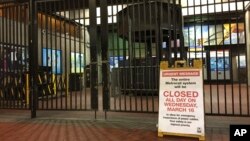An unprecedented 29-hour safety shutdown of subways in the nation's capital inconvenienced hundreds of thousands of people on Wednesday, but despite predictions of “Metromageddon” or “Metropocalypse,” it was hardly the end of the world.
Many riders shrugged it off, saying it's what they've come to expect from the aging, troubled Metro system.
One popular Twitter feed about the system, (at)unsuckdcmetro, was running a poll on whether the shutdown would solve “Metro's flaming cables problem.” Thousands voted, with more than three quarters saying no.
“Metro sucks,” said Bob Jones, 26, of Arlington, Virginia, as he waited for a bus. The subways are “always slow, always crowded,” he complained.
The nation's second-busiest rail system stopped its trains at midnight Tuesday for a system-wide inspection of its third-rail power cables after an electrical fire on Monday. Officials planned to reopen at 5 a.m. Thursday unless inspectors find an immediate safety threat, which the system's general manager said was unlikely.
Without working trains in the way, 22 inspection teams were walking 100 miles of underground track, checking power cables for potential problems. Metro spokesman Dan Stessel said Wednesday afternoon that some repairs were already being made. Metro planned an update later in the day.
Riders take more than 700,000 trips on Metro trains every day because it's still a quick way to get downtown from Maryland, Virginia and the city's outer neighborhoods. But the system has become less reliable and ridership has suffered.
Metro's general manager, Paul Wiedefeld, who took over in November after running the Baltimore-Washington airport, acknowledged in a public letter last month that the agency must “improve safety and security, deliver more reliable service, and continue reforms to get our financial house in order.”
The system has closed for days for weather, but this was believed to be the first shutdown for mechanical reasons.
“While the risk to the public is very low, I cannot rule out a potential life and safety issue here, and this is why we must take this action immediately,” Wiedefeld said.
Delayed trains, closed escalators and other annoyances have become frequent, but the Metro has had deadly accidents as well, including a 2009 collision between two trains that killed nine people. Another passenger died last year, when malfunctioning electrical equipment filled a train with smoke. An electrical fire Monday was blamed on “disturbingly similar conditions,” Wiedefeld said in a statement.
Michaun Jordan, 51, appreciated Metro's caution.
“At first I was a bit disappointed. Then I thought about it - it's best to be safe,” said Jordan, who took a $15 taxi for part of her commute that is normally a far cheaper rail ride.
Leander Talley, 52, who lives in Dale City and works in Alexandria, wasn't surprised by the shutdown.
“I kind of figured it would happen because of all the problems they've been having, but not on such short notice,” said Talley, who woke up an hour and a half early to get a head start on a grueling commute, saying he had to “catch five buses.”
Federal workers were encouraged to take the day off or telecommute. District of Columbia public schools, which don't have dedicated buses, said tardies and absences would be excused. Motorists slogged through a busy morning rush hour, and a city official said more than 500 people signed up for a free 24-hour bike-sharing membership.
U.S. Transportation Secretary Anthony Foxx said told a Senate Committee on Wednesday that he has directed the Federal Transit Administration to identify any federal grants to WMATA with unspent money and redirect that money to improve safety.
In addition to the electric cables, Foxx said he is concerned about red-light running, the use of emergency brakes, and track integrity. “The culture down there has to change and we can't enable these safety failures any longer,” he said.




